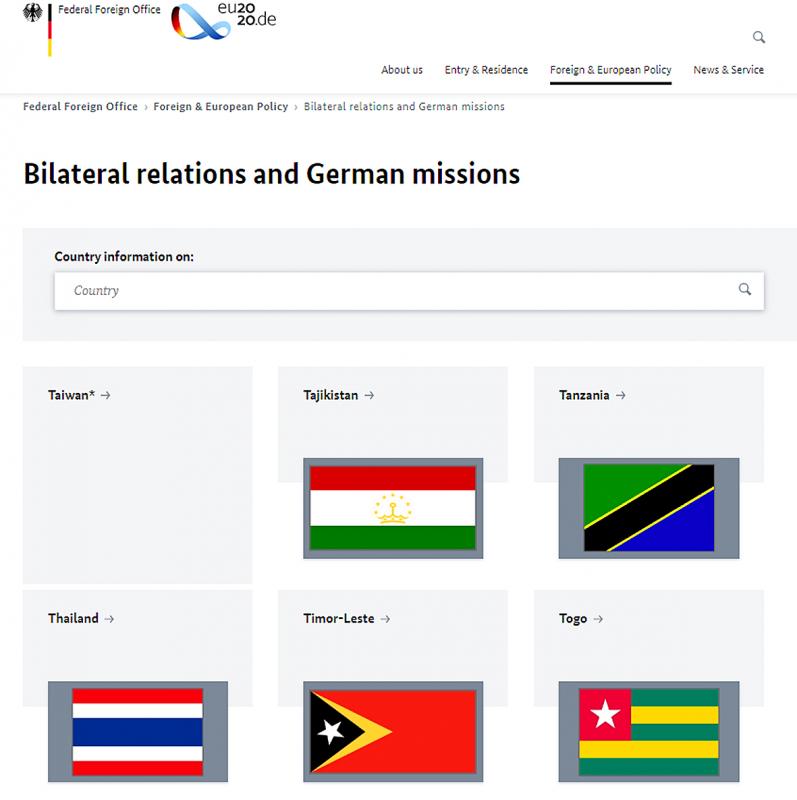The Ministry of Foreign Affairs yesterday said that it “cannot accept” the lack of a Republic of China flag on the Web site of the German Federal Foreign Office after a German reporter noticed that the flag was missing and brought it up at a news conference at the office in Berlin on Friday.
The ministry said that it has asked the office to explain the absence of the nation’s flag from the page on the Web site listing the nations with which Germany has bilateral relations.
The Web site showed a white box above the entry for Taiwan, in place of a flag.

Photo: Screen grab from the Web site of German Federal Foreign Office
Taiwan is the only nation on the Web site not to have its national flag displayed.
The office representing Taiwan in a different manner from how it represents other nations would cause prejudice and misunderstanding among people around the world, ministry spokeswoman Joanne Ou (歐江安) said in Taipei.
Office deputy spokesman Rainer Breul on Friday told the reporter that the lack of the flag did not represent a policy change in Germany, which follows the “one China” principle.
The site displayed a white box to differentiate Taiwan from nations with which Germany has formal diplomatic relations, Bruel said.
The German Institute Taipei said that the office’s Web site has never displayed the flag and the suggestion that the flag was removed under pressure from China was inaccurate.
The institute said that it hoped that the office could use an image symbolic of Taiwan, rather than simply leaving the space blank, but that officials who maintain the Web site can be slow in making changes.
The Taipei Representative Office in the Federal Republic of Germany confirmed that the German Federal Foreign Office had never displayed the national flag on its Web site, adding that in the past the site had not even listed Taiwan among bilateral nations and instead had placed it in a separate section on its own.
The site now properly lists Taiwan, its president, its premier and ministry officials, the representative office said, adding that it would continue to press for improved recognition of Taiwan within the German government.

The Central Election Commission has amended election and recall regulations to require elected office candidates to provide proof that they have no Chinese citizenship, a Cabinet report said. The commission on Oct. 29 last year revised the Measures for the Permission of Family-based Residence, Long-term Residence and Settlement of People from the Mainland Area in the Taiwan Area (大陸地區人民在台灣地區依親居留長期居留或定居許可辦法), the Executive Yuan said in a report it submitted to the legislature for review. The revision requires Chinese citizens applying for permanent residency to submit notarial documents showing that they have lost their Chinese household record and have renounced — or have never

A magnitude 5.6 earthquake struck off the coast of Yilan County at 12:37pm today, with clear shaking felt across much of northern Taiwan. There were no immediate reports of damage. The epicenter of the quake was 16.9km east-southeast of Yilan County Hall offshore at a depth of 66.8km, Central Weather Administration (CWA) data showed. The maximum intensity registered at a 4 in Yilan County’s Nanao Township (南澳) on Taiwan’s seven-tier scale. Other parts of Yilan, as well as certain areas of Hualien County, Taipei, New Taipei City, Taoyuan, Hsinchu County, Taichung and Miaoli County, recorded intensities of 3. Residents of Yilan County and Taipei received

Taiwan has secured another breakthrough in fruit exports, with jujubes, dragon fruit and lychees approved for shipment to the EU, the Ministry of Agriculture said yesterday. The Animal and Plant Health Inspection Agency on Thursday received formal notification of the approval from the EU, the ministry said, adding that the decision was expected to expand Taiwanese fruit producers’ access to high-end European markets. Taiwan exported 126 tonnes of lychees last year, valued at US$1.48 million, with Japan accounting for 102 tonnes. Other export destinations included New Zealand, Hong Kong, the US and Australia, ministry data showed. Jujube exports totaled 103 tonnes, valued at

BIG SPENDERS: Foreign investors bought the most Taiwan equities since 2005, signaling confidence that an AI boom would continue to benefit chipmakers Taiwan Semiconductor Manufacturing Co’s (TSMC, 台積電) market capitalization swelled to US$2 trillion for the first time following a 4.25 percent rally in its American depositary receipts (ADR) overnight, putting the world’s biggest contract chipmaker sixth on the list of the world’s biggest companies by market capitalization, just behind Amazon.com Inc. The site CompaniesMarketcap.com ranked TSMC ahead of Saudi Aramco and Meta Platforms Inc. The Taiwanese company’s ADRs on Tuesday surged to US$385.75 on the New York Stock Exchange, as strong demand for artificial intelligence (AI) applications led to chip supply constraints and boost revenue growth to record-breaking levels. Each TSMC ADR represents